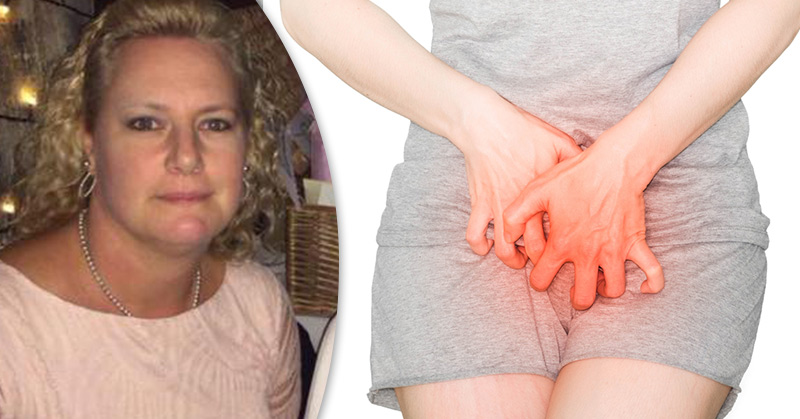Imagine going through two decades of unsuccessful doctor’s appointments and visits to specialists. It would be a miracle if you didn’t lose your mind trying to nail down what was ailing you. What would be worse is finding out years later that this mysterious problem of yours is actually an uncommon and dangerous type of cancer.
Meet Clare Baumhauer, a 45-year-old wife and mother-of-two, who suffered from a chronic burning vaginal itch for twenty years. Over the decades, she sought the expertise of several doctors but to no avail. Every single time, she would leave appointments with the same prognoses – early menopause, cystitis, thrush (i.e., an infection caused by candida fungus), bladder infection, or herpes.
“I’d see adverts on television for thrush creams and cystitis medicines and they made me think that problems down there were common,” Baumhauer said. (1)
Unfortunately, it was none of those things. It wasn’t until 2016 when the burning and itching sensations became unbearable at which point, she visited yet another doctor. Finally – this doctor gave Baumhauer a legitimate diagnosis, but it was not one that she was expecting: vulvar cancer.
But It All Started with Lichen Sclerosus

Baumhauer was just 12-years-old when she first started experiencing symptoms of lichen sclerosus, an uncommon but recurring condition that creates white patches of skin. While it can affect skin anywhere on the body, lichen sclerosus most often affects the genital area. Some of the symptoms can include: (2)
- Redness
- Mild to severe itching
- Pain or discomfort
- Smooth white patches of skin
- Blotchy, wrinkled patches
- Tears or bleeding
- Blistering or ulcerated sores
- Painful sex
Although doctors are stumped on what exactly causes lichen sclerosus, they suggest that previous skin damage or an overactive immune system or hormone imbalance could be to blame. What they do know, however, is that it can increase women’s risk of vulvar cancer by about 4 percent. (5)
Related: One Way to Check for Ovarian Cancer That Nobody Talks About
What Is Vulvar Cancer?
Appearing as a lump or sore on the vulva, this type of cancer occurs on the outer surface area of the female genitalia. Baumhauer developed a tear in her late-30s that she chalked up to be caused by sex.
“Sitting down had begun to hurt,” she said. “The ulcer had, in fact, double in size and had raised edges. It was sore.”
On top of that Baumhauer had some of the most common symptoms of vulvar cancer: (3)
- Itching that won’t stop
- Tenderness and pain
- Non-menstrual bleeding
- Skin changes (i.e., in color or thickness)
- A lump, wart-like bumps, or an ulcer (i.e., open sore)
Thankfully, Baumhauer was able to have a successful hemi-vulvectomy, an operation used to remove the ulcer, which turned out to be a tumor. Following the operation, scans revealed that the cancer had spread to her lymph nodes. So, she opted for radiation therapy – 25 sessions worth. Although these sessions burned her legs and triggered early menopause, doctors gave her the clear.
“I’m delighted to be cancer-free,” she said. (1) “However, the menopause coming on so suddenly is tough. My hair has thinned and I’ve had hot sweats. But, compared to cancer, I can deal with it. I’m just glad I’m alive.”
Vulvar cancer is rare. But, that doesn’t mean you shouldn’t be aware of the symptoms that we’ve listed above.
Clare Baumhauer’s Advice to Women Everywhere
“Just don’t be embarrassed. Go to the doctor’s and question why you have having to go back and forth. My condition goes back years and I easily went ten times. They should have noticed there was a difference between my symptoms and thrush or cystitis.
As soon as I saw my surgeon, who is a dermatologist and gynecologist, he spotted it straight away, but the doctors and nurses obviously didn’t realize. It’s not just affecting older people either; it’s usually women between 70 and 90 but a lot more [young] people are getting it now.
I’ve not missed a smear. They came back clear, so it is important to keep going and questioning them. It was hard for me to tell my story, it is personal, but if I can help just one person it will have been worth it.” (4)
Notice the Symptoms of Vulvar Cancer?
It’s better to be safe than sorry. If you notice any changes, book an appointment with your doctor as a preventative measure. Take Baumhauer’s advice and don’t put off getting checked because time is everything in the race against cancer. If her condition was caught earlier, it may not have turned into vulvar cancer.

